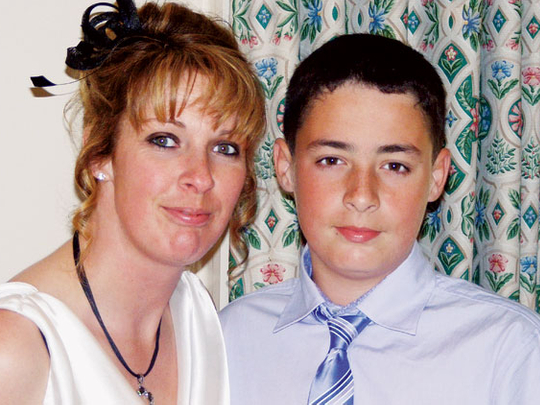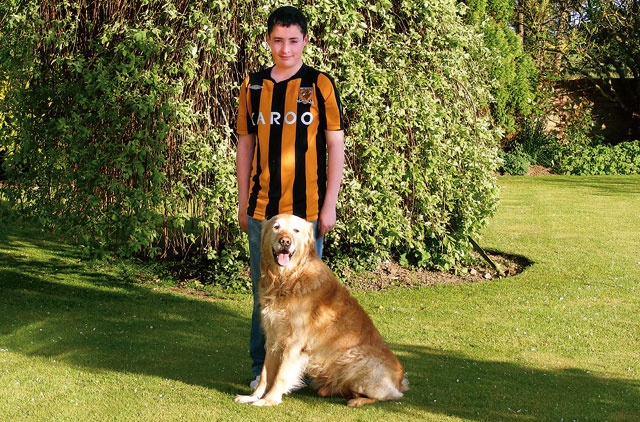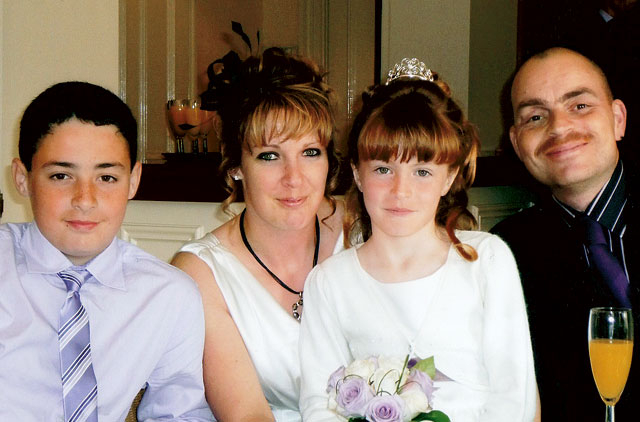
Every mother likes to kid themselves their children are special, but my 15-year-old son really was. Good-looking - though he didn't think so - cheeky but not in a horrible way, and protective of his little sister, Jasmine, he still liked cuddles with me and his dad, Richard, and he was smart. Last June he took his biology, French and English GCSE exams a year early and we couldn't have been prouder.
Josh was popular, and younger kids looked up to him. He was a bit of a leader I suppose. He'd encourage his friends to come out and play - but it was always one game: football. Josh supported Hull City (The Tigers), our local Championship League team, near our home in the UK, and attended every home game proudly wearing the club's amber and black shirt.
Every Friday night he played football at a local youth club, and some weekdays they'd go to the school field to play. One night last June he came running downstairs.
"I'm off to play football, Mum," he said. "Can I have some money for sweets please?" I handed him a £1 coin, ruffled his hair, told him to get a haircut, and he laughed as he ran out the door. It was a warm evening, light until around 10pm. When it started getting dark and Josh wasn't back I phoned his mobile. No answer. "You're in trouble when you get home," I muttered, but I knew sometimes he and his friends, Jacob Richards and James Oliphant, were having too much fun to hear their phones.
The fear cramped in my stomach
However, getting a little anxious, Richard, 40, and I set out to check on him, leaving my mum babysitting, Jasmine, ten.
Richard went round the corner to Jacob's house to check if he was there. I headed towards the school field. Then Richard came running towards me, shouting for me to get in the car and meet him at the field. "Josh is there," he yelled. "In an ambulance."
I watched him running off, pushing through nettles and hedges to reach the field, and I realised that something was really wrong. I had no idea what though - had Josh broken his leg, or knocked himself out? I just knew that fear was beginning to cramp in my stomach, and make my chest tight.
I must have looked as scared as I felt when I spotted Jacob's mum, Tracey, hurtling towards me. "I'll drive you," she said, and I nodded. Jacob was in the back, shaking, and gabbling. His words ricocheted around me, finally cutting through. The lads had played footie for an hour before deciding to head home. Josh had said he felt dizzy and was going to lie down for a bit. That wasn't unusual. Often one of the boys would take a break while the others carried on. So Jacob and James had a bit more of a kick about then came back to Josh, instantly realising he was in trouble. The air stilled around me as I heard the words: he was blue, and unconscious. My stomach cramped harder as the fear twisted further inside me.
Desperate bid to keep my son alive
Jacob's dad works as a lifeguard and had shown him resuscitation techniques, so he'd started doing mouth-to-mouth and pumping Josh's chest. James rang for an ambulance then followed Jacob's instructions and the boys took it in turns to resuscitate Josh.
Hearing this, part of me was thinking what amazing teenage boys these were. Others might have panicked and run off. Another part of my brain refused to take it in. "Surely," I convinced myself, "when we get to the hospital Josh will be sitting up, chatting. He'll be fine."
When we arrived at Hull Royal Infirmary a nurse was waiting for me at the entrance to Accident & Emergency. I looked at her face and paused. This had to be bad. As she took me by the arm, down the corridor, Richard came towards me, sobbing. I didn't need to ask. I knew my gorgeous son had gone. I dropped to the floor, screaming. Nothing made sense after that. I was howling, my sobs choking in my throat. Then I was running outside, grabbing Jacob tight, out of my mind with grief. Medical staff had to coax me back in. "What's the point?" I wanted to scream. "You can't bring him back." But I had to see my son.
Josh's brown eyes were open but their light had gone. His skin was cold, his hand a dead weight. I knew he'd been gone for some time. I didn't want to leave him, but there were formalities to deal with, police to see, a request to donate parts of Josh's body. Without knowing what killed him doctors couldn't use his major organs, but we were told 35 people could still potentially be helped. So, numb, we signed. At least someone else might see through his eyes.
When we got home at 2am all our family was there. I clutched the hospital carrier bag containing his possessions, sobbing. It was all I had left of my son. The £1 coin for sweets was still in his phone case. Just hours before I'd ruffled his hair and he'd gone out a healthy, fit, laughing, teenage boy - then dropped dead. How could that happen? The sentence went round and round in my head: How could that happen?
Telling Jasmine was the worst thing I've ever had to do. She cried, and I held her, sobbing.
The three of us walked to the school field that evening to lay flowers for Josh. Over 100 people were there, Josh's friends, girls weeping, boys being ‘brave'. We were still frozen with grief, but seeing how popular our son had been started to bring home what we'd lost forever.
At school the next week, pupils from Josh's year laid down on the school field, ‘planking' they call it, using their bodies to spell out ‘RIP JF' - his initials.
The post mortem found no reason for Josh's death, so his heart was sent to London specialists for tests. Their conclusion was ‘Sudden Adult Death Syndrome' (see below for more details) something was probably wrong with his heart, but they couldn't pinpoint what.
We buried Josh on 8 July, our wedding anniversary, and an agonising month of ‘limbo' since losing our boy. As the funeral cortege pulled up we were met by hundreds of people, nearly all wearing Hull City football shirts. Josh would have beamed.
Could Josh have been saved?
Living with our son's death is the most painful thing we've ever had to do. Discovering that 12 young people a week in the UK alone die from Sudden Adult Death Syndrome, usually due to undiagnosed heart conditions, was staggering.
We found that simple heart checks could prevent that, which was shocking, and made me angry. Josh was sporty, studied Physical Education at school which covered cardiovascular health, so why not do the tests? Could something as simple as an ECG have saved Josh? Thoughts like that haunt me.
As a family we're now doing what we can to try to prevent other young people dying from what are often perfectly treatable causes. We're raising money for the charity Cardiac Risk in the Young (www.c-r-y.org.uk) with the help of our local branch of the Hull City supporters club. Next April some of the funds we've raised will pay for two days when up to 200 of our local youngsters will have a heart health check.
As a family we've all been tested. We're fine, though doctors will keep an eye on Jasmine until she's about 17. Every morning now, the first thing I do is go into her bedroom and feel Jasmine. I need to know she's alive.
I still expect to hear Josh coming in from school, joking and laughing. I'll never get used to him not being here. We have pictures of him all over the house. He'd have hated it, but to be honest, I'd have wallpaper featuring his cheeky, smiling face in every room if I could. Instead, I focus on raising funds for the tests on other teenagers. If my son's death can save just one other child, it won't have been in vain.
Donna Fell, 37, Hornsea, East Yorkshire
What is Sudden Adult Death Syndrome?
Sudden Adult Death Syndrome, also known as Sudden Arrhythmic Death Syndrome, (SADS) can occur with no previous medical condition or sickness. One in ten cases has been found to originate as a form of heart defect.
The heart is essentially a muscle that pumps blood in a regular electrical rhythm, this rhythm can be detected by an electrocardiogram (ECG) that produces a squiggly line pattern. When arrhythmia of the heart occurs, there is a disruption in this electrical rhythm - a contraction and expansion of the heart's ventricles (known as ventricular arrhythmia), which affects the heart's ability to pump blood.
These disruptions can be caused after exercise and even while asleep. One of the most devastating traits of SADS is the sudden and unexpected loss of blood pressure as a result of the electrical heart dysfunction. When this happens the person can go into serious cardiac arrest.
According to Dr Elijah Behr, consultant cardiologist of St George's Hospital in London, once a person reaches this stage, they have about two minutes to be resuscitated or the brain and heart will be severely affected and death follows swiftly. Dr Behr has also referred to the condition being more common in young adults and children and more so among males with the ratio of male to female deaths being 3:1. SADS is essentially one of the forms of cardiac arrest described as ‘uncertainable' and occurs in one out of 20 cases of sudden cardiac death (SCD).
Symptoms of SADS are blackouts and dizziness, although both these might happen at relatively short notice. Unfortunately the survival of a person who has had an attack is relatively low. SADS can be inherited from a parent and can occur in about six in ten people whose parents have had the condition.
Since the attacks can be extremely unpredictable, Dr Behr recommends that people who are close blood relatives of someone who has had an attack or died due to sudden cardiac arrest, have a screening to determine if they have inherited the same medical conditions. In a scenario where a person has the same condition, it is highly recommended that a follow-up be done regularly.
Footballers who've collapsed with sudden heart conditions
Marc-Vivien Foé, 28: On 26 June, 2003, this Cameroonian midfielder collapsed and died during an international match, due to a hereditary heart condition later diagnosed as hypertrophic cardiomyopathy.
Daniel Jarque, 26: On 8 August, 2009, the Spanish Espanyol captain and central defender suffered a heart attack after a training session, and died after CPR and defibrillator treatments showed that his heart was unresponsive.
Fabrice Muamba, 23: On 17 March, 2012, the Zaire-born midfielder and a product of the famed Arsenal youth academy, suffered a cardiac arrest and collapsed during a game against Tottenham Hotspur. He was taken to hospital following treatment on the pitch, after which his heart stopped for 78 minutes before he was eventually revived. Fortunately, he made a full recovery.
Piermario Morosini, 25: On 14 April, 2012, the Livorno midfielder experienced a cardiac arrest, fell to the ground and got up again before collapsing again and losing consciousness during a match against Pescara, less than a month after the episode involving Fabrice Muamba. Morosini, who was conscious when stretchered off the field, died on the way to hospital.
Additional reporting by Mark Alphonsus




